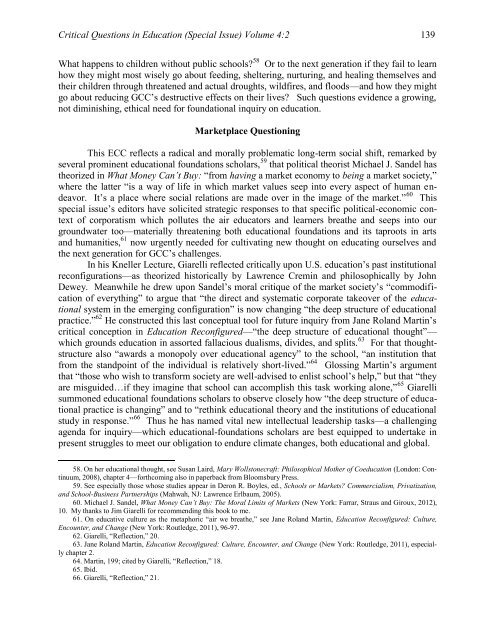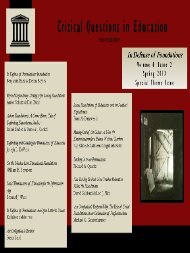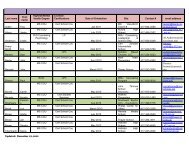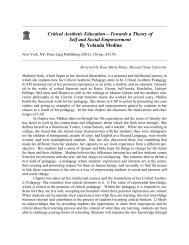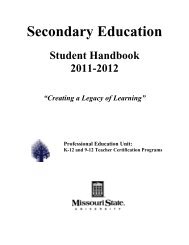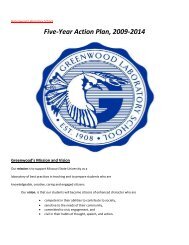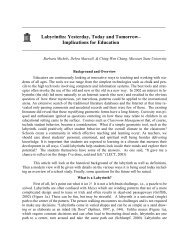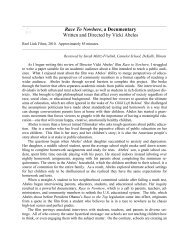An Obligation to Endure - College of Education
An Obligation to Endure - College of Education
An Obligation to Endure - College of Education
Create successful ePaper yourself
Turn your PDF publications into a flip-book with our unique Google optimized e-Paper software.
Critical Questions in <strong>Education</strong> (Special Issue) Volume 4:2 139<br />
What happens <strong>to</strong> children without public schools? 58 Or <strong>to</strong> the next generation if they fail <strong>to</strong> learn<br />
how they might most wisely go about feeding, sheltering, nurturing, and healing themselves and<br />
their children through threatened and actual droughts, wildfires, and floods—and how they might<br />
go about reducing GCC’s destructive effects on their lives? Such questions evidence a growing,<br />
not diminishing, ethical need for foundational inquiry on education.<br />
Marketplace Questioning<br />
This ECC reflects a radical and morally problematic long-term social shift, remarked by<br />
several prominent educational foundations scholars, 59 that political theorist Michael J. Sandel has<br />
theorized in What Money Can’t Buy: “from having a market economy <strong>to</strong> being a market society,”<br />
where the latter “is a way <strong>of</strong> life in which market values seep in<strong>to</strong> every aspect <strong>of</strong> human endeavor.<br />
It’s a place where social relations are made over in the image <strong>of</strong> the market.” 60 This<br />
special issue’s edi<strong>to</strong>rs have solicited strategic responses <strong>to</strong> that specific political-economic context<br />
<strong>of</strong> corporatism which pollutes the air educa<strong>to</strong>rs and learners breathe and seeps in<strong>to</strong> our<br />
groundwater <strong>to</strong>o—materially threatening both educational foundations and its taproots in arts<br />
and humanities, 61 now urgently needed for cultivating new thought on educating ourselves and<br />
the next generation for GCC’s challenges.<br />
In his Kneller Lecture, Giarelli reflected critically upon U.S. education’s past institutional<br />
reconfigurations—as theorized his<strong>to</strong>rically by Lawrence Cremin and philosophically by John<br />
Dewey. Meanwhile he drew upon Sandel’s moral critique <strong>of</strong> the market society’s “commodification<br />
<strong>of</strong> everything” <strong>to</strong> argue that “the direct and systematic corporate takeover <strong>of</strong> the educational<br />
system in the emerging configuration” is now changing “the deep structure <strong>of</strong> educational<br />
practice.” 62 He constructed this last conceptual <strong>to</strong>ol for future inquiry from Jane Roland Martin’s<br />
critical conception in <strong>Education</strong> Reconfigured—“the deep structure <strong>of</strong> educational thought”—<br />
which grounds education in assorted fallacious dualisms, divides, and splits. 63 For that thoughtstructure<br />
also “awards a monopoly over educational agency” <strong>to</strong> the school, “an institution that<br />
from the standpoint <strong>of</strong> the individual is relatively short-lived.” 64 Glossing Martin’s argument<br />
that “those who wish <strong>to</strong> transform society are well-advised <strong>to</strong> enlist school’s help,” but that “they<br />
are misguided…if they imagine that school can accomplish this task working alone,” 65 Giarelli<br />
summoned educational foundations scholars <strong>to</strong> observe closely how “the deep structure <strong>of</strong> educational<br />
practice is changing” and <strong>to</strong> “rethink educational theory and the institutions <strong>of</strong> educational<br />
study in response.” 66 Thus he has named vital new intellectual leadership tasks—a challenging<br />
agenda for inquiry—which educational-foundations scholars are best equipped <strong>to</strong> undertake in<br />
present struggles <strong>to</strong> meet our obligation <strong>to</strong> endure climate changes, both educational and global.<br />
58. On her educational thought, see Susan Laird, Mary Wolls<strong>to</strong>necraft: Philosophical Mother <strong>of</strong> Coeducation (London: Continuum,<br />
2008), chapter 4—forthcoming also in paperback from Bloomsbury Press.<br />
59. See especially those whose studies appear in Deron R. Boyles, ed., Schools or Markets? Commercialism, Privatization,<br />
and School-Business Partnerships (Mahwah, NJ: Lawrence Erlbaum, 2005).<br />
60. Michael J. Sandel, What Money Can’t Buy: The Moral Limits <strong>of</strong> Markets (New York: Farrar, Straus and Giroux, 2012),<br />
10. My thanks <strong>to</strong> Jim Giarelli for recommending this book <strong>to</strong> me.<br />
61. On educative culture as the metaphoric “air we breathe,” see Jane Roland Martin, <strong>Education</strong> Reconfigured: Culture,<br />
Encounter, and Change (New York: Routledge, 2011), 96-97.<br />
62. Giarelli, “Reflection,” 20.<br />
63. Jane Roland Martin, <strong>Education</strong> Reconfigured: Culture, Encounter, and Change (New York: Routledge, 2011), especially<br />
chapter 2.<br />
64. Martin, 199; cited by Giarelli, “Reflection,” 18.<br />
65. Ibid.<br />
66. Giarelli, “Reflection,” 21.


